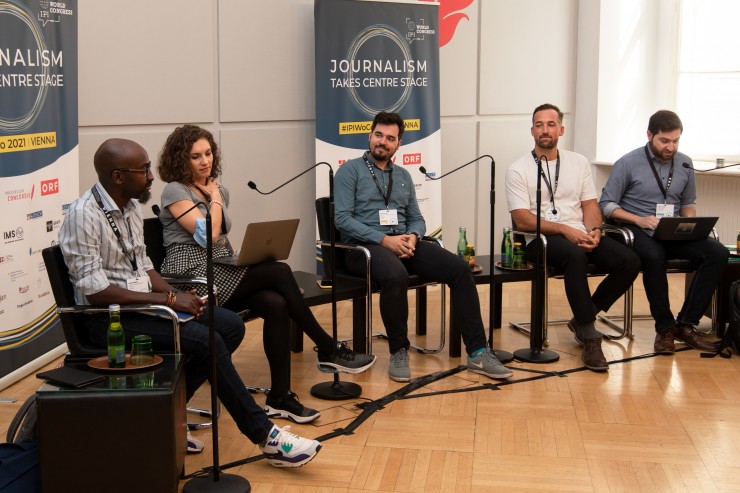IPI World Congress, IPI’s biggest annual event bringing dozens of journalists, editors and publishers around the world together on a varity of discussions on independent journalism, was held this year in Vienna between September 15 and 17 as a hybrid event.
In threeday-long sessions attended by dozens of journalists from various countries, a wide range of topics were discussed including the sustainability of independent journalism and the new ways of modelling business under repression.
A small delegation of IPI members from Turkey attended the World Congress in order to join different panels as speakers as well as to conduct meetings with the authorities.
Turkish delegation members and journalists Nevşin Mengü and Cansu Çamlıbel attended two different panels at the World Congress on September 16. The first, entitled “Product thinking- breaking through in the attention economy”, heard from David Tvrdoň of Petit Press in Slovakia; Karl Oskar Teien of Aftenposten in Norway; Nevşin Mengü of Deutsche Welle in Turkey; Nigel Mugamu founder of 263Chat in Zimbabwe and Simon Allison of The Continent in South Africa.
The speakers made presentations on their own business models and shared personal experience on their outlets’ success stories. Participants discussed the most effective ways to reach readers on various platforms including WhatsApp and YouTube, and the impact of the digitalization of journalism on the content and how it should be shaped.
Nevşin Mengü, a prominent journalist, producer and news anchor,described her transition from conventional to digital media. Besides her weekly news programme in Deutsche Welle Turkish, she explained how she started her own news channel on YouTube, which is the new and in-demand platform for Turkish journalists to continue quality and independent journalism despite the ongoing government crackdown.
According to Mengü,the traditional media in Turkey, 90% of which are either owned or controlled by the Turkish government according to IPI, is biased and has mostly lost its agenda-setting impact, leaving a majoirty ofelderly people to receive the news viatelevision and driving young readers to alternative digital news sources. “Young people in Turkey tend to get their news from Twitch. I get some young Twitch people on my channel as guests to catch their attention”, she said.Mengüalso emphasized the importance of algorithms and being active in social media: “You got to have your own community on digital media, that’s what YouTube algorithm wants. I’m always on my YouTube channel to read the comments and answer people, and I think it’s important to produce what people want basically.”
In the second session, entitled”Conversation: Modelling the business under repression”, panellists discussed how journalism can survive and thrive in the face of government pressure. The session includedChristoph Plate of KAS Media Programme in South Africa;Dapo Olorunyomi of Premium Times in Nigeria; Siddharth Varadarajan of The Wire in India and Veronika Munk of Telex in Hungary.
Cansu Çamlıbel, the editor-in chief of Duvar English in Turkey,shared her own experience of governmental pressure whenshe had to quit her former newspaper Hürriyet, where she worked as a Washington correspondent. It followed the sale of the newspaper to the pro-government business conglomarateDemirören which made it impossible for her to continue her independent reporting under a government controlled editorial policy.
“The repression took the form of self-cencorship for many of the pro-government media outlets in Turkey”, she said, continuing: “Pro-government companies are not owned by government itself,they are just owned by the business people who want to get into public tenders and have other stakes. For this reason, self-cencorship is a way for them to prove themselves.
Çamlıbel stressed that they have been following “the slow and quality journalism” method at Duvar English, yet it is difficult to implement due to the dramatic and fast-changing environment and political developments in Turkey.She concluded by stating that governmental repression had caused a further polarization within Turkish media and that this situation led independent and critical journalists towards activism, which has a negative effect on professional journalism.



